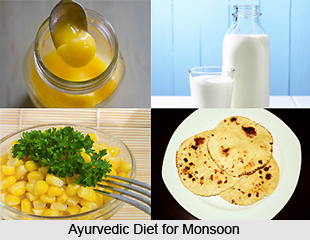 Ayurvedic diet for monsoon is very important to maintain as this is the time when vata is aggravated, pitta is accumulated, and kapha is pacified or controlled. Also, during monsoon, the weather is wet, soggy and humid. The humidity weakens the digestion in this season and exacerbates the vata and creates ama (food is not digested properly). Thus, Ayurveda advises to bring about a moderation in all aspects of life including diet.
Ayurvedic diet for monsoon is very important to maintain as this is the time when vata is aggravated, pitta is accumulated, and kapha is pacified or controlled. Also, during monsoon, the weather is wet, soggy and humid. The humidity weakens the digestion in this season and exacerbates the vata and creates ama (food is not digested properly). Thus, Ayurveda advises to bring about a moderation in all aspects of life including diet.
Grains like barley and wheat and flesh of animals of janagal desha should be consumed in sufficient quantities. Lukewarm water should be consumed. milk, ghee and plain butter can also be taken. Fish from lakes, which are oily, can be consumed. An important constituent of the diet during the rainy season should be honey. More vata- pacifying foods should be a part of the diet. Hot baths and showers are advised and it should be taken after an oil massage.
Diet Chart for Monsoon Season
This is an average diet chart hence it is advisable to consult with an Ayurvedic doctor before following the chart.
Breakfast: During this season, one should opt for ingredients that are light and are easily digestible. The food should provide quick energy and not lead to lethargy. Barley and gram are such cereals.
Lunch: Lunch should be prepared in such a way that it contains all the six tastes which include sweet, sour, salty, bitter, pungent and astringent.
It is good if one begins the lunch with something sweet, followed by the main course containing salty, sour, and pungent foods. End the meal with bitter and astringent items that are easy to digest.
Dinner: Unlike the lunch, the dinner should be very light. Rice and milk should be given prominence. Cereals like corn rotis should also be given importance as they are easy to digest. If one has consumed a heavy snack in the evening then it is advisable to go for one or two bananas and a big glass of milk for dinner.
Food to Avoid During Monsoon
During this season, dry, cold, heavy foods like cheese and curds should not be consumed. Bengal gram, field pea should not be eaten. Fermented and stale foods, and cold, ice beverages should also not be consumed. Afternoon naps should be avoided, as they tend to make the body heavier. Alcohol should be consumed in small quantities.





